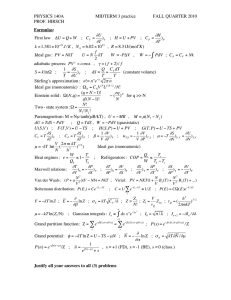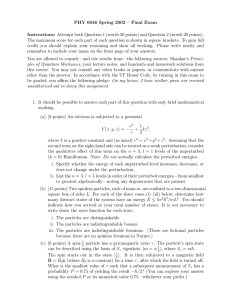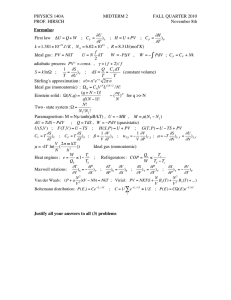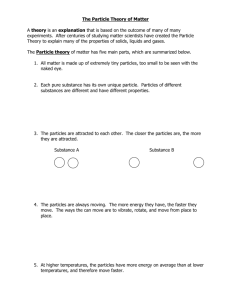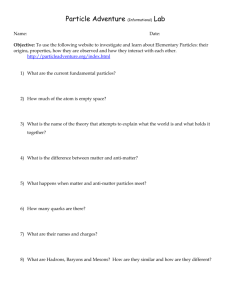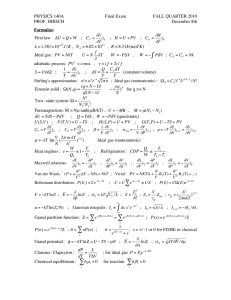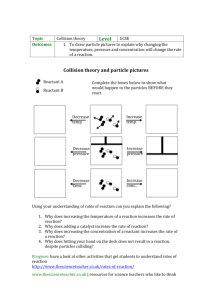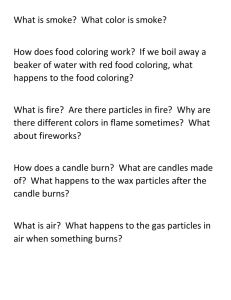$
advertisement
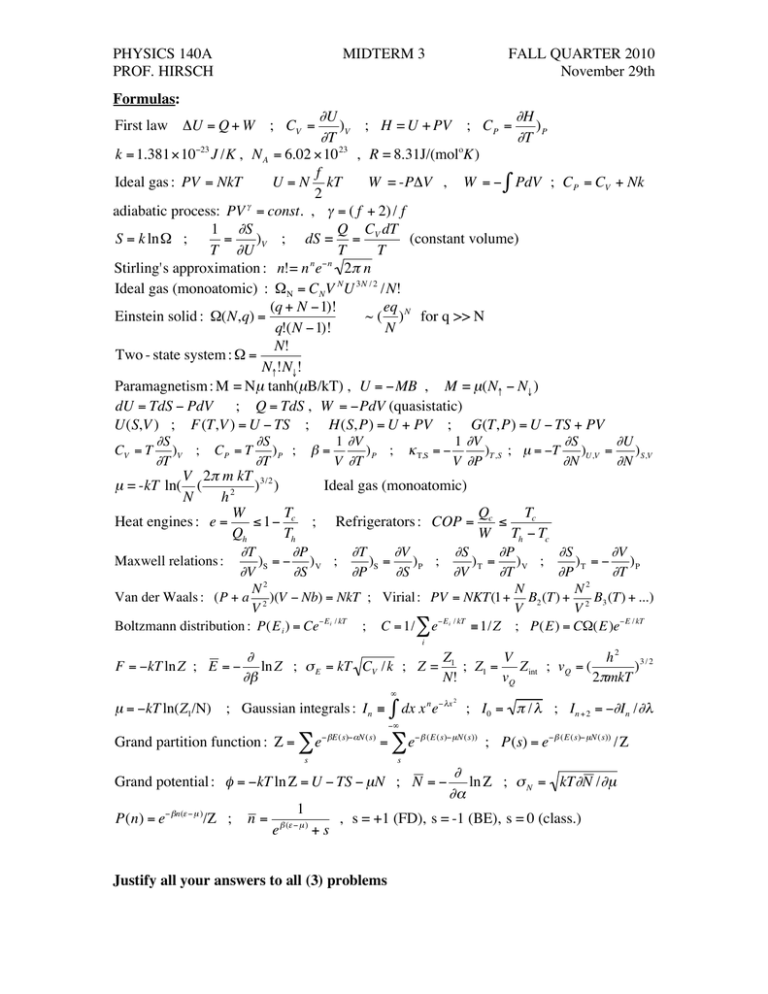
PHYSICS 140A PROF. HIRSCH MIDTERM 3 FALL QUARTER 2010 November 29th Formulas: #U #H )V ; H = U + PV ; CP = )P #T #T k = 1.381"10#23 J /K , N A = 6.02 "10 23 , R = 8.31J/(moloK) f Ideal gas : PV = NkT U = N kT W = -P"V , W = # $ PdV ; CP = CV + Nk 2 adiabatic process: PV " = const. , " = ( f + 2) / f 1 #S Q C dT S = k ln" ; = )V ; dS = = V (constant volume) T #U T T Stirling's approximation : n!= n n e"n 2# n ! Ideal gas (monoatomic) : "N = CNV NU 3N / 2 /N! (q + N #1)! eq Einstein solid : "(N,q) = ~ ( ) N for q >> N q!(N #1)! N N! Two - state system : " = N#!N$! Paramagnetism : M = Nµ tanh(µB/kT) , U = "MB , M = µ(N# " N$ ) dU = TdS " PdV ; Q = TdS , W = "PdV (quasistatic) U(S,V ) ; F(T,V ) = U " TS ; H(S,P) = U + PV ; G(T,P) = U " TS + PV First law "U = Q + W ; CV = ! ! ! ! ! ! ! ! ! ! ! ! ! ! ! ! ! "S "S 1 "V 1 "V "S "U )V ; C P = T ) P ; # = ) P ; $ T,S = % )T ,S ; µ = %T )U ,V = ) S,V "T "T V "T V "P "N "N V 2" m kT 3/2 µ = -kT ln( ( ) ) Ideal gas (monoatomic) N h2 W T Q Tc Heat engines : e = " 1# c ; Refrigerators : COP = c " Qh Th W Th # Tc "T "P "T "V "S "P "S "V Maxwell relations : )S = # ) V ; )S = )P ; )T = )V ; )T = # )P "V "S "P "S "V "T "P "T 2 2 N N N Van der Waals : (P + a 2 )(V " Nb) = NkT ; Virial : PV = NKT(1+ B2 (T) + 2 B3 (T) + ...) V V V Boltzmann distribution : P(E i ) = Ce"E i / kT ; C = 1/ # e"E i / kT $ 1/Z ; P(E) = C%(E)e"E / kT CV = T i # Z V h2 3/2 F = "kT ln Z ; E = " ln Z ; % E = kT CV /k ; Z = 1 ; Z1 = Z int ; vQ = ( ) #$ N! vQ 2&mkT % µ = "kT ln(Z1/N) ; Gaussian integrals : In # n " $x 2 & dx x e ; I0 = ' / $ ; In +2 = "(In /($ "% ! Grand partition function : " = & e# $E(s)#%N (s) = & e# $ (E (s)# µN (s)) ; P(s) = e# $ (E (s)# µN(s)) /" s s ! Grand potential : " = #kT ln $ = U # TS # µN ; N = # ! P(n) = e" #n($ " µ )/% ; n= 1 e # ($ " µ ) +s , s = +1 (FD), s = -1 (BE), s = 0 (class.) ! ! % ln $ ; ' N = kT%N /%µ %& Justify all your answers to all (3) problems PHYSICS 140A PROF. HIRSCH MIDTERM 3 FALL QUARTER 2010 November 29th Problem 1 A particle can be in one of three energy states, of energy 0, 2ε and 5ε and degeneracy 1, 3 and 1 respectively. (a) Find the average energy of this particle at infinite temperature. (b) At what temperature is the average energy of this particle 2ε? (c) At what temperature is this particle equally likely to have energy 0 and energy 2ε? (d) Find the value of the Helmholtz free energy F at temperature kT=5ε. Give your answer in terms of ε. ! Problem 2 A diatomic molecule composed of distinguishable atoms has rotational energy levels E r ( j) = "r j( j + 1) of degeneracy (2j+1), with j=0, 1, 2, 3..., and εr=0.002eV. It also can vibrate along the line connecting the two atoms, with the energy difference between two neighboring vibrational energy levels being 0.04eV. (a) At temperature kT=0.02eV, give the average rotational and vibrational energies in eV (one of the answers may be slightly approximate). (b) Give an approximate value for the rotational partition function at temperature kT=0.002eV that is accurate to three decimal places. (c) Find the heat capacity per molecule from vibration only, at temperatures (i) kT=0.08eV, (ii) kT=0.8 eV, (iii) kT=800,000 eV. Give your answers in terms of k. Problem 3 A system has three non-degenerate single-particle levels with energy 0, ε and 2ε respectively. (a) Assuming the system has exactly 2 particles, how many states does this system have if the two particles are spinless and (i) fermions, (ii) bosons, (iii) classical distinguishable? (b) What is the total number of states that this system can have if the particles are spinless fermions but their number is not fixed? (c) If the particles are spinless fermions, what are the possible values for the total energy of this system at zero temperature depending on the number of particles? Assume the system has an integral number of particles. (d) What are the possible values of the chemical potential for the answers given in (c)? You should give a range of possible values of the chemical potential, in terms of ε, for each of the answers given in (c). Justify all your answers to all problems
